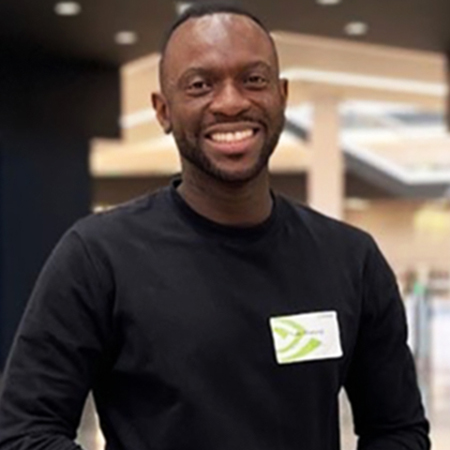Intron Health has trained its algorithms with data sets from clinicians across Africa to boost the accuracy of spoken medical terms, which a larger, more general-purpose platform would have struggled with.
West African healthcare systems rely on healthcare practitioners to manage administrative tasks. The need to write detailed patient notes and fill out forms compounds the strain on healthcare systems. In addition to the difficulty in delivering care, medical practices are also constrained by the paper-based administrative burden: paper records slow the pace of medical practices.
However, time is a precious resource where healthcare providers such as physicians, nurses and midwives are in high demand. Hospital staff see hundreds of patients every day, despite lacking the appropriate resources to deal with this influx. As a consequence, the workforce is strained and exhibits a high level of job-related fatigue both physically and mentally.

“I worked at one of West Africa’s largest hospitals, where I would routinely see more than 30 patients a day, and it was a very hard job,” says Tobi Olatunji, Founder of Intron Health.
A recent report from the World Health Organisation found that Africa has a ratio of 1.55 health workers per 1,000 people. This is below the WHO threshold density of 4.45 health workers per 1,000 people needed to deliver essential health services and achieve universal health coverage.
According to the WHO, Africa’s long-standing healthcare professional shortage is the result of multiple factors, including inadequate training capacity, rapid population growth, international migration, weak governance of the health workforce, career changes as well as poor retention of health personnel. WHO projects that the shortage of health workers in Africa will reach 6.1 million by 2030.
To address this situation, in his first year of practice, Olatunji and his partner Olakunle Asekun imagined a programme to plough through the mounds of paperwork that are taking up far too much of doctors’ precious time, freeing them up to help more patients.
Building the start-up
With encouragement from medical school mentors, Olatunji got a master’s in medical informatics degree from the University of San Francisco and another in Computer Science at Georgia Tech. He started working as a machine-learning scientist in the US by day and writing code on nights and weekends to help digitise African hospitals.
However, his journey was not smooth sailing. A pilot test run during the pandemic hit a snag. The first few doctors to use the code took 45 minutes to finish their patient notes. Feeling awkward in front of a device, some health workers said they prefer pen and paper.
“We made a hard decision to invest in natural language processing and speech recognition,” says Olatunji. He was already familiar with this technology, which he used in his day job.
Intron Health tackled this problem with the power of artificial intelligence. Intron has two major products: electronic medical record software and speech-to-text transcription. These unlock more productivity and efficiency for hospitals thanks to automation capabilities.
Typing can be burdensome and time-consuming for strained professionals. Speech-to-text uses a transcribe function and artificial intelligence to convert spoken information into routine formats that healthcare providers can easily copy and paste into the patient’s electronic medical record.
People are familiar with transcribing functions offered by big technology companies. The main difference between these products and the services offered by Intron Health resides in its capacity to address the diversity of the African patient population.
Intron Health trained its algorithms with data sets from clinicians across Africa to boost the accuracy of medical terms. A larger, more general-purpose platform would struggle to accurately capture medical terms.
With this combination of products, hospital managers can track the operations from start to finish, from booking appointments to payments. Intron Health now employs 14 team members and continues its expansion.

Moving to the next level
The combination of medical terminology and thick African accents produced horrible results with most existing speech-to-text software. Olatunji knew there would be no shortcut to training the models.
The Intron team evaluated several commercial and open-source speech recognition frameworks and large language models before choosing to build with NVIDIA NeMo, a software framework for text-based generative AI. The resulting models were trained on NVIDIA Graphics Processing Units in the cloud.
Olatunji initially tried to train with central processing units as the cheapest option, but it took forever. So they switched to a single GPU and eventually grew to using several of them.
The resulting transcribe app captures doctors’ dictated messages with more than 92% accuracy across more than 200 African accents. It reduces on average the time healthcare professionals spend on paperwork to a sixth of what it was before the technology, according to an ongoing study.
Intron Health is implementing it across hospitals in four African countries. Even the doctor with the fastest typing skills in the study got a 40% benefit in transcription that is in use at several African hospitals.
Going to market
Olatunji knew his models needed high-quality audio data. Intron Health created an application to capture sound bites of medical terms spoken in different accents.
To date, the application has gathered more than a million clips from more than 7,000 people across 24 countries, including 13 African nations. It is one of the largest datasets of its type, parts of which have been released as open source to support African speech research.
Intron Health refreshes its models every other month as more data comes in. Intron Health’s initiative represents a big step towards democratised access to conversational AI, as previous research focused on North American and European patterns of speech.
Little research exists on speech recognition for African accents in a clinical setting. So, working with Africa’s technology communities offering support like Data Science Nigeria, the natural language processing research organisation Masakhane, and the scientist network hub Zindi, Intron Health launched AfriSpeech-200, a developer challenge to kickstart research using its data.
Medical technology also lags in diversity and inclusion, so Olatunji recently launched an initiative that addresses this issue. Bio-RAMP Lab is a global community of researchers from a marginalised background working on problems they care about at the intersection of AI and healthcare. The group already has a half dozen papers under review at major conferences.
Intron Health is now helping hospitals in Africa find creative ways to acquire the hardware they need. This is another challenge on the way to opening up huge opportunities.
Once healthcare data gets digitised, a whole new world is unlocked for research into areas like predictive models for early warning systems for epidemics. “We cannot do this without data,” says Olatunji.

How Intron Health built its product
- Tobi Olatunji and Olakunle Asekun imagined a programme to plough through mounds of paperwork taking up too much of doctor’s time.
- The Intron team evaluated several commercial and open-source speech recognition frameworks and large language models before choosing to build with NVIDIA NeMo.
- A software framework for text-based generative AI was used and the models were trained on NVIDIA GPUs in the cloud.
- Intron Health trained its algorithms with data sets from clinicians across Africa to boost the accuracy of medical terms.
- The resulting transcribe application captures messages dictated from 200 African accents from medical professionals with 92% accuracy.
- The transcribe application reduces the time healthcare professionals spend on paperwork by a sixth.
- Intron Health is implementing it across hospitals in four African countries.
- The application has ingested more than million clips from more than 7,000 people across 24 countries, including 13 African nations and is one of the largest datasets of its type.
- The models are refreshed every other month as more data comes in and represents a big step towards democratised access to conversational AI.
- Previous research efforts have focused on North American and European patterns of speech.
NVIDIA’s Inception Programme
Intron Health is part of NVIDIA’s Inception Programme, which sits within the company’s developer ecosystem. It is aimed at developers and start-ups and offers firsthand training on how to become a deep-learning ambassador. It offers more than 450 software development kits and models, GPU-optimised software, model scripts, and containerised apps.
The training programme uses research papers, technical documentation, webinars, blogs, and regular news. At the end of the technical training, developers who are part of the programme will receive a certification. This kind of training empowers entrepreneurs like Tobi Olatunji to implement their vision.



